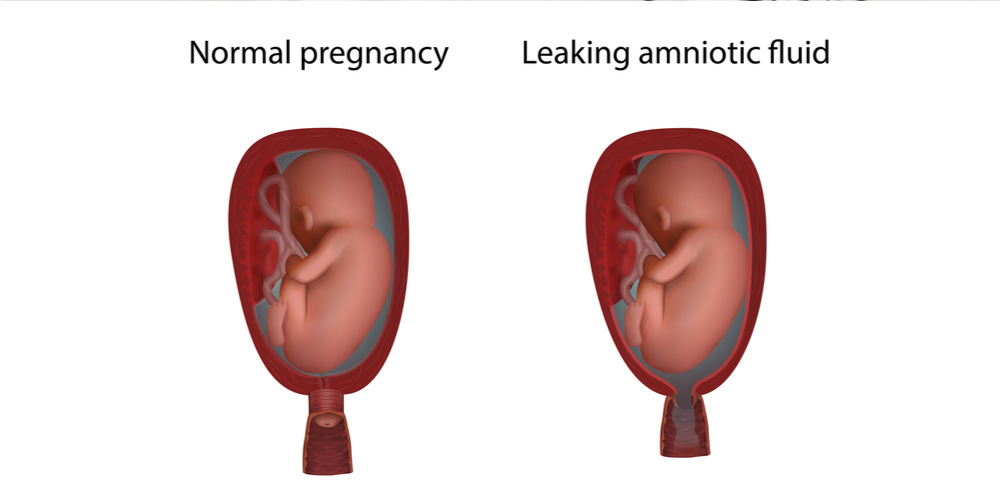
During the pregnancy, the baby is protected with a warm, fluid protective cushion called the amniotic fluid. This fluid sac supports the baby as it develops and grows. Amniotic fluid has many components that are necessary for the healthy growth of the baby. Some of those components are enzymes, hormones, nutrients, and the baby’s urine.
Your womb can have one quart of amniotic fluid at max. As you approach your due date, specifically when you are four to five weeks due, the amniotic fluid starts decreasing because the body starts preparing itself for the delivery.
In the ultrasounds conducted before delivery, the doctor makes an estimate of the amount of amniotic fluid present around the baby in the belly. There is a possibility that there might be leakage of the amniotic fluid.
If excessive fluid starts to leak out, the condition is called oligohydramnios. If fluid flows or gushes out because of the rupturing of the amniotic sac, it is called the rupturing of membranes.
It can be difficult to tell if the fluid that is leaking is amniotic fluid. There are, however, some factors that can ensure this. The following are some symptoms of leakage of amniotic fluid.
Table of Contents
What does premature rupture of membranes or PROM mean?
When the amniotic sac that is supporting your baby breaks or ruptures, and the amniotic fluid from within starts leaking before labor but after 37 weeks, the doctors use the term premature rupture of membranes.
Is leakage of amniotic fluid common during pregnancy?

No, the water usually breaks at the time of labor and not before. PROM, i.e premature rupture of membranes, means leakage of amniotic fluid. There is only a 10 to 15 percent chance of this after 37 weeks of pregnancy. Preterm premature rupture of membrane or PPROM is rare and happens only in 3 to 4 percent pregnancies.
What is meant by the premature rupture of membrane or PPROM?
When the amniotic sac ruptures and there is leaking of amniotic fluid before 37 weeks of pregnancy, it is called preterm premature rupture of membrane or PPROM.
What are some common symptoms of preterm premature rupture of membranes (PPROM)?
Gushin and flowing of fluid from the vagina before the 37th week is the main symptom of the preterm premature rupture of membranes. You can check whether the fluid is urine or amniotic fluid by taking a sniff test. This is what you should check for:
- If it smells like ammonia, it is urine. If it doesn’t, there is a big chance that it is amniotic fluid.
- If it is a sweet type of smell, it is amniotic fluid.
- If it does not smell like ammonia but smells foul, it is the amniotic fluid that might be infected.
When you are in labor and your water breaks, there is more leakage of fluids lying down, than while standing upright. This happens because while standing or walking, the baby’s head blocks the opening and does not let the fluid leak. If you have any questions and doubts about leaking of amniotic fluid, consult your doctor and get all the information you need.
What are the causes of leakage of amniotic fluid?

Most frequently, there is leaking of amniotic fluid right before labor, or before 24 hours of labor.
Who can face the problem of leakage of amniotic fluid?
Some women are exposed more to the risk of leaking of amniotic fluid than others because of the following reasons:
- History of rupture of amniotic fluid in a previous pregnancy
- Smoking during the nine months of pregnancy
- Chronic vaginal bleeding during pregnancy
- Presence of an STD
- Having abruption of the placenta
- Having a case of bacterial vaginosis
- Multiple pregnancies
Consequences of leaking amniotic fluid
Some of the results of PPROM and PROM include the following:
- Premature delivery
- Chances of infection of amniotic fluid
- Compression or pressure upon the umbilical cord
How can you avoid the premature rupture of membranes?

It is not possible to completely eliminate the possibility of both PPROM and PROM. However, there are some things that can be done to lower the possibility of both. Being regular with the prenatal appointments, doctors’ appointments, following a healthy diet, and not smoking during pregnancy.
If PPROM or PROM are diagnosed in time and treated well, there is a very good chance that both you and the baby will be healthy. However, if it is a case of premature delivery your baby will stay in NICU for some days.
When should you call your doctor
You should call your doctor immediately if you suspect the rupture of the amniotic sac and leaking of the amniotic fluid. If it is close to the due date, it might be your water breaking. Moreover, the color of fluid can tell you if it is because of labor or premature rupture of membranes.
If the leaking fluid is greenish-yellow or brownish-yellow in color, call your doctor immediately. This color indicates that the baby has had a bowel movement in the womb. If not taken care of immediately, it can cause complications in breathing after the baby is born.
Also Read:







